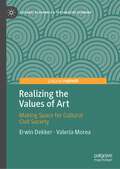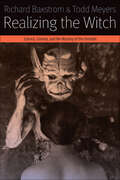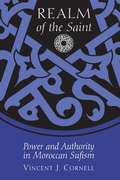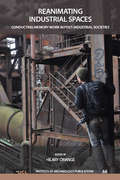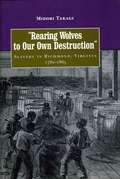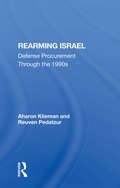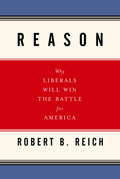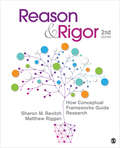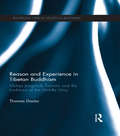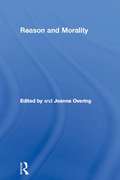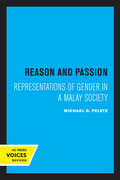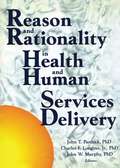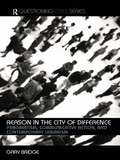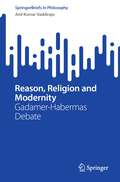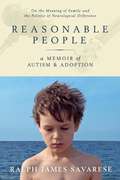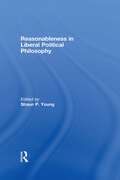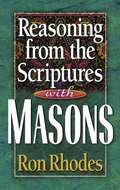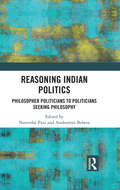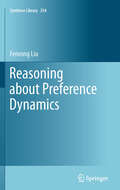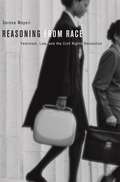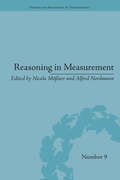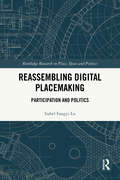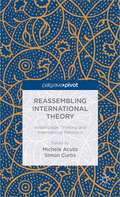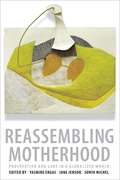- Table View
- List View
Realizing the Values of Art: Making Space for Cultural Civil Society (Cultural Economics & the Creative Economy)
by Erwin Dekker Valeria MoreaThis book provides a novel approach to the understanding and realization of the values of art. It argues that art has often been instrumentalized for state-building, to promote social inclusion of diversity, or for economic purposes such as growth or innovation. To counteract that, the authors study the values that artists and audiences seek to realize in the social practices around the arts. They develop the concept of cultural civil society to analyze how art is practiced and values are realized in creative circles and co-creative communities of spectators. The insights are illustrated with case-studies about hip-hop, Venetian art collectives, dance festivals, science-fiction fandom, and a queer museum. The authors provide a four-stage scheme that illustrates how values are realized in a process of value orientation, imagination, realization, and evaluation.The book relies on an interdisciplinary approach rooted in economics and sociology of the arts, with an appreciation for broader social theories. It integrates these disciplines in a pragmatic approach based on the work of John Dewey and more recent neo-pragmatist work to recover the critical and constructive role that cultural civil society plays in a plural and democratic society. The authors conclude with a new perspective on cultural policy, centered around state neutrality towards the arts and aimed at creating a legal and social framework in which social practices around the arts can flourish and co-exist peacefully.
Realizing the Witch: Science, Cinema, and the Mastery of the Invisible (Forms of Living)
by Richard Baxstrom Todd MeyersBenjamin Christensen’s Häxan (The Witch, 1922) stands as a singular film within the history of cinema. Deftly weaving contemporary scientific analysis and powerfully staged historical scenes of satanic initiation, confession under torture, possession, and persecution, Häxan creatively blends spectacle and argument to provoke a humanist re-evaluation of witchcraft in European history as well as the contemporary treatment of female “hysterics” and the mentally ill.In Realizing the Witch, Baxstrom and Meyers show how Häxan opens a window onto wider debates in the 1920s regarding the relationship of film to scientific evidence, the evolving study of religion from historical and anthropological perspectives, and the complex relations between popular culture, artistic expression, and concepts in medicine and psychology. Häxan is a film that travels along the winding path of art and science rather than between the narrow division of “documentary” and “fiction.” Baxstrom and Meyers reveal how Christensen’s attempt to tame the irrationality of “the witch” risked validating the very "nonsense" that such an effort sought to master and dispel. Häxan is a notorious, genre-bending, excessive cinematic account of the witch in early modern Europe. Realizing the Witch not only illustrates the underrated importance of the film within the canons of classic cinema, it lays bare the relation of the invisible to that which we cannot prove but nevertheless “know” to be there.
Realm of the Saint: Power and Authority in Moroccan Sufism
by Vincent J. CornellIn premodern Moroccan Sufism, sainthood involved not only a closeness to the Divine presence (walaya) but also the exercise of worldly authority (wilaya). The Moroccan Jazuliyya Sufi order used the doctrine that the saint was a "substitute of the prophets" and personification of a universal "Muhammadan Reality" to justify nearly one hundred years of Sufi involvement in Moroccan political life, which led to the creation of the sharifian state.
Reanimating Industrial Spaces: Conducting Memory Work in Post-industrial Societies (UCL Institute of Archaeology Publications #66)
by Hilary OrangeReanimating Industrial Spaces explores the relationships between people and the places of former industry through approaches that incorporate and critique memory-work. The chapters in this volume consider four broad questions: What is the relationship between industrial heritage and memory? How is memory involved in the process of place-making in regards to industrial spaces? What are the strengths and pitfalls of conducting memory-work? What can be learned from cross-disciplinary perspectives and methods? The contributors have created a set of diverse case studies (including iron-smelting in Uganda, Puerto Rican sugar mills and concrete factories in Albania) which examine differing socio-economic contexts and approaches to industrial spaces both in the past and in contemporary society. A range of memory-work is also illustrated: from ethnography, oral history, digital technologies, excavation, and archival and documentary research.
Rearing Wolves to Our Own Destruction: Slavery in Richmond Virginia, 1782-1865 (Carter G. Woodson Institute Series)
by Midori TakagiRICHMOND WAS NOT only the capital of Virginia and of the Confederacy; it was also one of the most industrialized cities south of the Mason-Dixon Line. Boasting ironworks, tobacco processing plants, and flour mills, the city by 1860 drew half of its male workforce from the local slave population. Rearing Wolves to Our Own Destruction examines this unusual urban labor system from 1782 until the end of the Civil War. Many urban bondsmen and women were hired to businesses rather than working directly for their owners. As a result, they frequently had the opportunity to negotiate their own contracts, to live alone, and to keep a portion of their wages in cash. Working conditions in industrial Richmond enabled African-American men and women to build a community organized around family networks, black churches, segregated neighborhoods, secret societies, and aid organizations. Through these institutions, Takagi demonstrates, slaves were able to educate themselves and to develop their political awareness. They also came to expect a degree of control over their labor and lives. Richmond's urban slave system offered blacks a level of economic and emotional support not usually available to plantation slaves. Rearing Wolves to Our Own Destruction offers a valuable portrait of urban slavery in an individual city that raises questions about the adaptability of slavery as an institution to an urban setting and, more importantly, the ways in which slaves were able to turn urban working conditions to their own advantage.
Rearming Israel: Defense Procurement Through The 1990s (Publications Of The Jaffee Center For Strategic Studies, Tel Aviv University #No. 17)
by Aharon Klieman Reuven PedatzurThis study analyzes the key functions of arms planning and procurement in the ongoing Israeli defence effort. Part I addresses individual constraints placed on the shaping of arms control policy. Part II asks how Israel might best meet its arms needs over the next decade.
Reason
by Robert B. ReichFor anyone who believes that liberal isn't a dirty word but a term of honor, this book will be as revitalizing as oxygen. For in the pages of Reason, one of our most incisive public thinkers, and a former secretary of labor mounts a defense of classical liberalism that's also a guide for rolling back twenty years of radical conservative domination of our politics and political culture.To do so, Robert B. Reich shows how liberals can:.Shift the focus of the values debate from behavior in the bedroom to malfeasance in the boardroom .Remind Americans that real prosperity depends on fairness .Reclaim patriotism from those who equate it with pre-emptive war-making and the suppression of dissent If a single book has the potential to restore our country's good name and common sense, it's this one.From the Trade Paperback edition.ics of fear and favor-whose defining gesture is to equate dissent with treason-and for reinstating the traditional American politics of reason.He calls on liberals to close ranks and maintain a permanent platform that can grow in power.He provides clear answers to the barrage of accusations (of communism, of elitism, of anti-Americanism) with which Radcons have been pummeling liberals for at least two decades. He analyzes the propaganda savvy, the commitment, and the organization of the Radcons, and what liberals can learn from each.He suggests how liberals can wrest the sole ownership of patriotism from the Radcons-there's more to it than flag waving.He calls on liberals to recognize their strengths. He wants them to remember their unfaltering protection of the central American invention: a society (ours was the first in history) that allows no aristocracy and hence belongs to all its citizens. And he wants liberals to recall how, twice in the last century, liberalism's dedicated reforms rescued American free enterprise from its own excesses: first from the robber barons in the early 1900s, then in the depression-devastated 1930s.He demonstrates, with quotations from the most respected opinion polls, how far the radical conservative agenda is from representing the national will. And he tells why he believes that once again-assuming the readiness to take action-American liberals are on the verge of winning the battle for America.From the Hardcover edition.
Reason & Rigor: How Conceptual Frameworks Guide Research
by Dr Sharon M. Ravitch Dr J. Matthew RigganDesigned for novice as well as more experienced researchers, Reason & Rigor by Sharon M. Ravitch and Matthew Riggan presents conceptual frameworks as a mechanism for aligning literature review, research design, and methodology. The book explores the conceptual framework—defined as both a process and a product—that helps to direct and ground researchers as they work through common research challenges. Focusing on published studies on a range of topics and employing both quantitative and qualitative methods, the updated Second Edition features two new chapters and clearly communicates the processes of developing and defining conceptual frameworks.
Reason and Experience in Tibetan Buddhism: Mabja Jangchub Tsöndrü and the Traditions of the Middle Way (Routledge Critical Studies in Buddhism)
by Thomas DoctorBased on newly discovered texts, this book explores the barely known but tremendously influential thought of the Tibetan Buddhist teacher, Mabja Jangchub Tsöndrü (d. 1185).This Tibetan Buddhist master exercised significant influence on the interpretation of Madhyamaka thinking in Tibet during the formative phase of Tibetan Buddhism and plays a key role in the religious thought of his day and beyond. The book studies the framework of Mabja’s philosophical project, holding it up against the works of both his own Madhyamaka teachers as well as those of central authors of the later "classical period". The emerging account of the evolution of Madhyamaka in Tibet reveals a striking pattern of transformative appropriations. This, in turn, affords us insights into the nature and function of tradition in Tibetan religious culture and Mahāyāna Buddhism at large. Innovation is demanded for both the advancement and consolidation of tradition. This ground-breaking book is an invaluable contribution to the study of Tibetan philosophy. It is of great interest to Buddhist practitioners, specialists in Buddhist philosophy and Tibetan Buddhism.
Reason and Morality (ASA Monographs)
by Joanna OveringFirst Published in 1985. Routledge is an imprint of Taylor & Francis, an informa company.
Reason and Passion: Representations of Gender in a Malay Society
by Michael G. PeletzThis book provides a historical and ethnographic examination of gender relations in Malay society, in particular in the well-known state of Negeri Sembilan, famous for its unusual mixture of Islam and matrilineal descent. Peletz analyzes the diverse ways in which the evocative, heavily gendered symbols of "reason" and "passion" are deployed by Malay Muslims. Unlike many studies of gender, this book elucidates the cultural and political processes implicated in the constitution of both feminine and masculine identity. It also scrutinizes the relationship between gender and kinship and weighs the role of ideology in everyday life. Peletz insists on the importance of examining gender systems not as social isolates, but in relation to other patterns of hierarchy and social difference. His study is historical and comparative; it also explores the political economy of contested symbols and meanings. More than a treatise on gender and social change in a Malay society, this book presents a valuable and deeply interesting model for the analysis of gender and culture by addressing issues of hegemony and cultural domination at the heart of contemporary cultural studies. This title is part of UC Press's Voices Revived program, which commemorates University of California Press’s mission to seek out and cultivate the brightest minds and give them voice, reach, and impact. Drawing on a backlist dating to 1893, Voices Revived makes high-quality, peer-reviewed scholarship accessible once again using print-on-demand technology. This title was originally published in 1996.
Reason and Rationality in Health and Human Services Delivery
by John W Murphy Jean A Pardeck Charles Longino, JrReason and Rationality in Health and Human Services Delivery is the first book to discuss the topic of decisionmaking and services from a multidisciplinary approach. It uses theory and social considerations, not just technology, as a basis for improved services. Health and human service students and professionals will learn how to form rational and reasonable decisions that take their clients’cultural backgrounds into consideration when identifying an illness or appropriating any kind of intervention. With a particular emphasis on theories, models, organizational settings, technologies, and practitioner training methods that lead to culturally sensitive decisions, Reason and Rationality will help you deliver efficient and improved medical and social services to clients from all ethnic backgrounds. Recognizing reason as the centerpiece of most of Western philosophy, this text reveals how our idea of truth, fact, and order are wrongly thought to be universal; yet, Western principles are continually used in the decision-making process for health and social services. Focusing on the policy implications of decisionmaking in medical and social service settings, this text works to incorporate a broad range of factors into the reasoning process, such as cultural traditions and beliefs, that will result in better treatment for patients. Giving you suggestions and strategies for upgrading reasoning and decision-making processes and applying them to every area of service, Reason and Rationality discusses different themes that will help you improve services to patients, such as: the rationale currently used to justify decision-making strategies concerning medical and human services using computer technology to make clinical assessments revising administrative structure, management theories, and organizational strategies so that decision-making processes enhance the overall quality of service delivery how the practitioner/patient relationship is important in choosing the proper treatment soliciting community-based input to assess the public’s health and human service needs in order to lessen political involvement in decision-making stages In addition, Reason and Rationality provides information and examples that show why you should consider the “life-world”--the values, beliefs, and commitments of a culture’s history-- as the key to understanding the powers of reasoning that specify parameters of health and illness.
Reason in the City of Difference (Questioning Cities)
by Gary BridgeIn the modernist city rationality ruled and subsumed difference in a logic of identity. In the postmodern city, reason is abandoned for an endless play of difference. Reason in the City of Difference poses an alternative to these extremes by drawing on classical American philosophical pragmatism (and its contemporary developments in feminism and the philosophy of communication) to explore the possibilities of a strengthening and deepening of reason in the contemporary city. This is a transactional rationality based on communication, rather than cognition, involving bodies as much as minds, and non-discursive, as well as discursive competences. It is a rationality that emerges out of difference and from within the city, rather than over and above it. Using pragmatist philosophy and a range of suggestive examples of urban scholarship, this fascinating book offers a new, alternative reading of the city.
Reason, Religion and Modernity: Gadamer-Habermas Debate (SpringerBriefs in Philosophy)
by Anil Kumar VaddirajuThis book deals with the question of understanding religion and its relationship with politics in the context of developing countries. It reviews specific theories, such as modernisation theory, marxism, liberalism, hermeneutics and critical approach to explain questions related to religion and religious traditions. The book focuses on the recent attempts to theorise religion by Jurgen Habermas. It argues modernisation and orthodox Marxian theory are inadequate in understanding the recent spurt of religious phenomenon in politics. It discusses Hans-Georg Gadamer’s view to show a way forward regarding dialectical hermeneutics in facilitating a dialogue between different traditions and religions. The book is of interest to students, scholars, practitioners of development, and all those who concern themselves with the questions of religion, tradition, modernity and secular well-being in developing countries such as India and beyond.
Reason: Why Liberals Will Win the Battle for America
by Robert B. ReichFrom Robert B. Reich, passionate believer in American democracy, and public servant in both Democratic and Republican administrations--an urgent call to liberals to reclaim their political clout. Reason is a guide to confronting and derailing what he sees as the mounting threat to American liberty, prosperity, and security posed by the radical conservatives--Radcons, as he calls them--whose agenda has dominated public discourse and radically affected government action since the election, by a minority vote, of George W. Bush. It is an agenda that turns American tradition upside down-embracing "preemptive" war, disrupting essential alliances, reacting to terrorism by weakening our civil liberties, distorting our economy by endowing the rich with tax breaks while cutting social services, attempting to hunt down immorality in bedrooms rather than in boardrooms, where corporate malfeasance is still not legally prevented from chomping away at ordinary American earnings. Reich offers a bold plan for defeating this politics of fear and favor-whose defining gesture is to equate dissent with treason-and for reinstating the traditional American politics of reason. He calls on liberals to close ranks and maintain a permanent platform that can grow in power. He provides clear answers to the barrage of accusations (of communism, of elitism, of anti-Americanism) with which Radcons have been pummeling liberals for at least two decades. He analyzes the propaganda savvy, the commitment, and the organization of the Radcons, and what liberals can learn from each. He suggests how liberals can wrest the sole ownership of patriotism from the Radcons-there's more to it than flag waving. He calls on liberals to recognize their strengths. He wants them to remember their unfaltering protection of the central American invention: a society (ours was the first in history) that allows no aristocracy and hence belongs to all its citizens. And he wants liberals to recall how, twice in the last century, liberalism's dedicated reforms rescued American free enterprise from its own excesses: first from the robber barons in the early 1900s, then in the depression-devastated 1930s. He demonstrates, with quotations from the most respected opinion polls, how far the radical conservative agenda is from representing the national will. And he tells why he believes that once again-assuming the readiness to take action-American liberals are on the verge of winning the battle for America.
Reasonable People: A Memoir Of Autism And Adoption
by Ralph James SavareseWatch an interview with DJ on CNN Listen to Ralph Savarese's interview on NPR's "The Diane Rehm Show" Visit the book's website: www. reasonable-people. com "Why would someone adopt a badly abused, nonspeaking, six-year-old from foster care?" So the author was asked at the outset of his adoption-as-a-first-resort adventure. Part love story, part political manifesto about "living with conviction in a cynical time," the memoir traces the development of DJ, a boy written off as profoundly retarded and now, six years later, earning all "A's" at a regular school. Neither a typical saga of autism nor simply a challenge to expert opinion, Reasonable People illuminates the belated emergence of a self in language. And it does so using DJ's own words, expressed through the once discredited but now resurgent technique of facilitated communication. In this emotional page-turner, DJ reconnects with the sister from whom he was separated, begins to type independently, and explores his experience of disability, poverty, abandonment, and sexual abuse. "Try to remember my life," he says on his talking computer, and remember he does in the most extraordinarily perceptive and lyrical way. Asking difficult questions about the nature of family, the demise of social obligation, and the meaning of neurological difference, Savarese argues for a reasonable commitment to human possibility and caring.
Reasonableness in Liberal Political Philosophy
by Shaun P. YoungPreviously published as a special issue of the Critical Review of Social and Political Philosophy, this collection offers a thought-provoking critique of the role of the concept of reasonableness in liberal political theory, focusing on the proposed relationship between reasonableness and the establishment and preservation of a just and stable liberal polity.The essays explore the explicit and implicit use of the idea of reasonableness, presenting an analysis that incorporates normative and empirical observations and employs a number of different analytical approaches, including liberalism, feminism, environmentalism, Marxism, and communitarianism. This unique book provides in a single volume a critique that engages not only a vast array of issues but also a diversity of critical perspectives. It not only rectifies a deficiency in the existing scholarship, but also addresses the issues of socio-political justice and stability, offering new, insightful critiques that respond to the increasingly complex circumstances and conflicts that confront life in contemporary pluralistic societies. Reasonableness in Liberal Political Philosophy will be a valuable resource for those interested in liberal political theory and its potential usefulness in helping to secure a just and stable polity.
Reasoning From The Scriptures With Masons
by Ron RhodesDid you know that: The name of Jesus is removed from Masonic rituals to avoid offending anyone? The "secret" name of Masonry's god specifically includes Jehovah, Baal, and Osiris? Many people are unaware of the far-reaching impact the Masonic Lodge has today. Ron provides accurate information on the structure and beliefs of Masonry, then carefully contrasts its practices with Scripture. Continuing the easy-to-follow question-and-answer format of the Reasoning from the Scriptures series, this informative guide reveals the occultic symbolism, secret oaths, and hidden rituals that are an integral part of Masonic tradition. Readers will discover honest, fact-based insights on the dangers of this fraternal order and specific suggestions for sharing biblical truth with Masons.
Reasoning Indian Politics: Philosopher Politicians to Politicians Seeking Philosophy
by Narendar Pani Anshuman BeheraThis volume examines the multiple forms of reasoning in Indian politics and explores a framework to understand them. In the process, it looks at a series of issues involving the relationship between politics and philosophy, including the status of political theory, political practices, identity politics, and political ontology. The book argues that in the years leading up to and soon after independence, the task of conceptualizing politics was largely in the domain of practising politicians who built theories and philosophical methods, and further took those visions into the practice of their politics. It maintains that Indian politicians since then have not been as inclined to articulate their theories or methods of politics. This book traces the transition from philosopher politicians to politicians seeking philosophy in Indian polity in the post-independence era and its implications for current practices. It views Indian political philosophy from the standpoints of political theorists, philosophers, and practitioners. With expert and scholarly contributions, this volume will be of interest to students and researchers of Indian political thought and political philosophy, social sciences, and humanities.
Reasoning about Preference Dynamics
by Fenrong LiuOur preferences determine how we act and think, but exactly what the mechanics are and how they work is a central cause of concern in many disciplines. This book uses techniques from modern logics of information flow and action to develop a unified new theory of what preference is and how it changes. The theory emphasizes reasons for preference, as well as its entanglement with our beliefs. Moreover, the book provides dynamic logical systems which describe the explicit triggers driving preference change, including new information, suggestions, and commands. In sum, the book creates new bridges between many fields, from philosophy and computer science to economics, linguistics, and psychology. For the experienced scholar access to a large body of recent literature is provided and the novice gets a thorough introduction to the action and techniques of dynamic logic.
Reasoning from Race: Feminism, Law, and the Civil Rights Revolution
by Serena MayeriIn the 1960s and 1970s, analogies between sex discrimination and racial injustice became potent weapons in the battle for women s rights, as feminists borrowed rhetoric and legal arguments from the civil rights movement. Serena Mayeri s Reasoning from Race is the first history of this key strategy and its consequences for American law.
Reasoning in Measurement (History and Philosophy of Technoscience)
by Nicola Mößner and Alfred NordmannThis collection offers a new understanding of the epistemology of measurement. The interdisciplinary volume explores how measurements are produced, for example, in astronomy and seismology, in studies of human sexuality and ecology, in brain imaging and intelligence testing. It considers photography as a measurement technology and Henry David Thoreau's poetic measures as closing the gap between mind and world. By focusing on measurements as the hard-won results of conceptual as well as technical operations, the authors of the book no longer presuppose that measurement is always and exclusively a means of representing some feature of a target object or entity. Measurement also provides knowledge about the degree to which things have been standardized or harmonized – it is an indicator of how closely human practices are attuned to each other and the world.
Reassembling Digital Placemaking: Participation and Politics (Routledge Research in Place, Space and Politics)
by Isabel Fangyi LuThis book presents digital placemaking as a new testing ground for urban democracy. It explores the participatory practices of digital placemaking and their implications on blurring formal and informal boundaries of decision-making and urban politics.Drawing on examples from Australia, China and Taiwan, the book examines how contemporary cities are witnessing an era when digitality becomes a mode of placemaking and participation becomes an urban condition. Such developments manifest as urban activism, creative branding, tech placemaking and digital governance that trigger changes in urban engagement and politics. This book views digital placemaking through an assemblage lens to demonstrate how it can be a relational site of contentions and collaborations among civil society, industries and governments without observance of strict boundaries. Contrary to an often binary and zero-sum reading of urban politics, this book advocates for a tripartite assemblage model of urban politics that is neither hierarchical nor deterministic. This book proposes an ouroboros model as a systematic approach that conceptually anchors digital placemaking studies to the nexus of urban institutions and digital technologies. It reconceptualises urban politics as a relational process of nuances, contingency and complexity in the flux of cosmopolitan power movements and inquiries. Ultimately, the book develops the notion of socio-technical natality to counter the myth of tech inevitability and instil a thesis of hope and change.This book will interest researchers, policymakers and professionals in urban studies, media studies, cultural studies, urban communication, creative placemaking, community engagement, urban advocacy and urban governance.
Reassembling International Theory: Assemblage Thinking and International Relations
by Simon Curtis Michele AcutoWhat can 'assemblage' thinking contribute to the study of international relations theory? This study seeks to investigate how the various debates on assemblages in social theory can contribute to generating critical considerations on the connections and dissociation of political agency, physical world and international dynamics.
Reassembling Motherhood: Procreation and Care in a Globalized World
by Sonya Michel Jane Jenson Yasmine ErgasThe word “mother” traditionally meant a woman who bears and nurtures a child. In recent decades, changes in social norms and public policy as well as advances in reproductive technologies and the development of markets for procreation and care have radically expanded definitions of motherhood. But while maternity has become a matter of choice for more women, the freedom to make reproductive decisions is unevenly distributed. Restrictive policies, socioeconomic disadvantages, cultural mores, and discrimination force some women into motherhood and prevent others from caring for their children.Reassembling Motherhood brings together contributors from across the disciplines to consider the transformation of motherhood as both an identity and a role. It examines how the processes of bearing and rearing a child are being restructured as reproductive labor and care work change around the globe. The authors examine issues such as artificial reproductive technologies, surrogacy, fetal ultrasounds, adoption, nonparental care, and the legal status of kinship, showing how complex chains of procreation and childcare have simultaneously generated greater liberty and new forms of constraint. Emphasizing the tension between the liberalization of procreation and care on the one hand, and the limits to their democratization due to race, class, and global inequality on the other, the book highlights debates that have emerged as these multifaceted changes have led to both the fragmentation and reassembling of motherhood.
